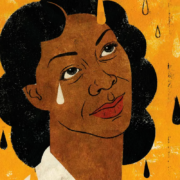To care for, protect, and prepare our children for adulthood, black moms cannot merely accept the world as it is.
When I was 7 or 8 years old, my mother would put on Whitney Houston’s “Greatest Love of All” every day before we left home for school and work, and we sang along from start to finish. Standing in the living room moments before we shrugged on our coats, we belted out lyrics about self-reliance and persistence, finding a kind of armor through song. We wrapped ourselves in the richness and power of Whitney’s voice, reaching for the high notes right along with her. I can’t remember how long this lasted, but I consider it a defining ritual of my childhood. She’s too young now, but I plan to do something similar with my daughter, Isobel, who is 2. Black children and their families need this. We need a kind of anthem, a melodic reminder to ourselves and each other that we are not who the wider world too often tells us we are: criminal, disposable, lazy, undeserving of health or peace or laughter.
Black mothers like me know that motherhood is deeply political. Black women are more likely to die during pregnancy or birth than women of any other race. My own mother, who has never married and who worked full-time throughout my childhood, is a model for my own parenting, but culture-war messages from the left and the right tell us she fell short of maternal ideals. My grandmother, great-grandmother, aunts, and elders in the community supported my mother as she raised me. Their investment in me and in other children—some their blood relations, some not—demonstrated an ethic that we can all learn from. Sociologist Patricia Hill Collins has called this “other-mothering,” a system of care through which black mothers are accountable to and work on behalf of all black children in a particular community. “I tell my daughter all the time: We don’t live for the ‘I.’ We live for the ‘we,’” Cat Brooks, an organizer in Oakland, told me.
Featured Image, Illustration by Edel Rodriguez.
Full article @ The Nation

